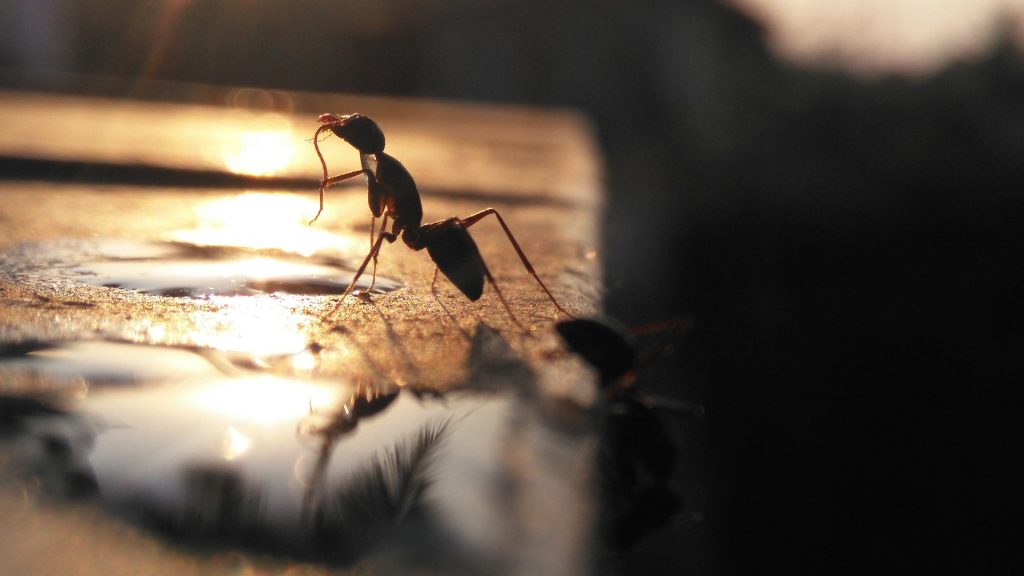How to Get Rid of Ants in Car
When most people think of an ant problem, they imagine unwanted picnic pests or ants crawling across the kitchen counter but ants can also show up in unexpected places, one of them is your car.
Having ants in your car can not only be annoying, but it can also be dangerous. Ants can bite, sting, and distract you while you are driving. As soon as you discover these critters in your car, it's time to start getting rid of them.
So, how to get rid of ants in car? Many methods can be used to get rid of the ants in the car. The fastest methods are with the use of ant foggers, traps, and sprays. Before applying any pesticides, you should try to get rid of the ants in the car without them. The first thing you should try is to repark your car to a different location and do a thorough vacuuming. After that, wipe clean your car so that you remove any food or juice spills. Now wash and clean the car from the outside (use high pressure). If this does not help, try out methods with pesticides.

In later sections, we have made a step by step guide on how to get rid of the ants in the car, we suggest reading it because we have also provided recommended products that you can use (foggers, traps and sprays).
Removing ants from your car can be done but how did they get there in the first place? Is there any hidden damage you should check for? And how can you keep ants from coming back to your car? Let's dig a bit deeper.
Why Are There Ants in My Car?
To understand why ants decided to make their way into your vehicle, it's helpful to know a bit about ant behavior. Ants have nests, usually located underground or in trees. To find their food, they wander around randomly in the hopes of coming across something to eat.
Related: What Do Ants Eat? | Ant Feeding Habits
When one of them does locate food, it leaves a trail of chemicals, called pheromones, to help other ants find their way there, and help carry the food back to the nest. That means if you see one or two ants in your car, it may be because you've parked close to an ant nest, and you are seeing a few ants simply scouting for food.
However, if your car appears to be infested with ants, chances are they have found a food source, even a small one, inside your vehicle.
What Types of Ants Infest Cars?

Any local species of ant is capable of infesting your car. It all depends on your region in the world. But one thing is for sure: If you have a source of food in your vehicle, be it plant or animal-based, there will be ants who are interested in eating it.
The ants you are most likely to see in your vehicle are "worker ants." Each colony is made up of groups of ants with different jobs. One of the worker ants' jobs is to go out and find food for the rest of the colony.
Related: How Many Types of Ants Are There: Ant Identification Chart
How to Get Rid of Ants in Car – Step by Step Instructions
Step 1 – Repark Your Car to a Different Location
It is likely that an ant nest is located nearby your car, so before you start getting rid of the ants in and on your vehicle, move it away from the source of the problem. If you can, move the car away from trees and any grassy area where you suspect the ants may have their nest.
Step 2 – Start Vacuuming
This step will not only remove the ants from your car, but it will also suck up any crumbs which may have attracted them in the first place. Vacuum as deep into cracks and cervices as possible. Remove all trash from your vehicle. Even the slightest bit of food residue left on packaging can be enough to attract ants to your car.
Step 3 – Wipe Down the Interior of Your Car
Be sure to clean up any food spills on the floor or upholstery. Ants are not just attracted to solid foods. Even a small soft drink or juice spill could entice them.
Step 4 – Thoroughly Wash the Outside of Your Car
If you don't have a hose with a significant amount of pressure, go to a self-serve car wash or have the car cleaned by professionals. Don't forget to wash inside the wheel wells and engine.
Disclaimer: Be careful when washing inside the engine, as too much pressure could damage certain components. If you are unsure what to do, take your car to a professional.
Step 5 – If You Still See Ants, Consider Using a Pesticide Treatment Inside Your Car
This method includes ant bait, a fogger or a bug spray. We'll discuss these options in the next section.
Ant Killer for Car | Pesticide Treatment
What to do if you still have ants in your car? After you've already re-parked your car, vacuumed it, removed any trash, wiped down the interior, and washed the exterior, you may want to think about using some type of ant pesticide.
Here are a few options when it comes to landing a final blow to these unwanted pests. Consider safety, time, and weather conditions before deciding which option is best for you.
Ant Traps for Car

Terro T300 Liquid Ant Baits - 2 Pack
- Kills the ants you see and the ones you don't
- Ready to use set the bait, attract ants, and kill the colony
- Stay Fresh tab keeps liquid bait Fresh until opened
Terro Liquid Ant Baits are the best-selling ant bait on the market. They are effective and affordable. They are also considered safer than most insecticides, as there is no danger of inhaling the product.
The concept is simple: The bait contains a formula that mimics ant food, it smells sweet to ants but it is toxic to them. The worker ants will carry tiny pieces of bait back to the nest to share with the colony, including the queen.
Eventually, the whole colony will be wiped out.Just be sure to keep the product away from pets and small children who may try to touch or ingest the bait.
Ant Fogger for Car
Sale

Raid Concentrated Deep Reach Fogger is ideal for car use, as it is made to penetrate hard to reach places. Not only does it kill all ants inside the vehicle, but it will falso continue to kill ant entering the car for up to two months after its initial use.
Just be sure to be cautious when choosing to fog your car. Read the instructions carefully. Thoroughly air out the vehicle for several hours after use, and run the a/c system to clear out your vents.
Ant Spray for Car
Raid Ant and Roach Killer can be sprayed directly on ants to kill them. While this may help "spot treat" your ant problem, when used alone, it is not likely to be successful in removing the ant infestation from your car and keeping it from coming back.
As with a fogger, be sure to keep the car well ventilated after using this pesticide.
How to Get Ants out of Specific Places in Your Car
Ants are tiny creatures, capable of hiding just about anywhere in your car. This is where ant bait will come in handy, as it isn't necessary to reach or kill each individual ant in order to be effective.
However, if you are anxious to kill the ants as quickly as possible, here are some tips in case you find them in especially hard to reach places.
Ants in Car Door Frame
Using an ant spray may be your best bet for removing ants from your car door frame. If you can, remove the door latch (also called a striker) and spray the bug spray inside.
Ants in Car Dashboard
It doesn't make sense to take apart your dashboard to remove an ant infestation. As mentioned above, just killing individual ants that you see will not effectively remove the infestation. In this case, it would be best to let ant bait work its magic.
How to Get Rid of Ants in Car Engine

If ants have infested your car engine, you may want to consider parking your car inside a garage, opening the hood, and using a fogger. Just remember to follow all safety instructions and air out the garage and car thoroughly afterward.
How to Get Rid of Ants in Your Car Naturally: Home Remedies for Ants in Your Car
If you are looking for a more natural solution to your ant problem, here are a few things to try:
Chalk
To prevent ants from climbing back onto your vehicle, draw chalk circles around your tires. It is unclear exactly why ants avoid chalk, but it is a simple, safe, and effective deterrent.
Spices
- Cinnamon can kill ants and also work as a repellant. It smells great too! Sprinkle it into hard to reach places in your car.
- Mint leaves are another ant deterrent and may prove to be a less-messy option than cinnamon. Tie bunches of leaves together and place them around your car to make it less attractive to ants.
Vinegar
Ants hate the scent of vinegar. It can also be effective in removing their pheromone trails (which they use to lead other ants back to your car). Fill a spray bottle with a solution of 50% water and 50% vinegar. Spray and wipe down the surfaces of your car.
How to Prevent Ants From Infesting Your Car
Be conscious of where you are parking. If you can, avoid parking your car near trees and large grassy areas. Also, clean your car regularly. While it may be tempting to have a trash can in your car, even small bits of food waste in the trash can be enough to attract ants.
Therefore, it's best to remove the trash immediately. Be sure to clean up spills right away. It may be helpful to keep a sealed container of moist towels or baby wipes in your car to quickly clean up any messes.
If your car leaks when it rains, have it repaired.Ants are also attracted to moisture, so having standing water or wet upholstery in your car can also lead to an ant problem.
Ants in a Brand New Car

If you've purchased a new car and discovered an ant problem, ask yourself the following:
- How many ants are you seeing?
- Just one or two, or is it a more serious problem?
- Were the ants in the car before you drove it home and parked it?
- Is there any food residue in the car that may have attracted the ants, and if so, was the food residue in the car when you purchased it?
Depending on the answers to these questions, consider contacting the dealership to inform them of the issue. If you think the ants were in the car before you purchased it, act quickly, the longer you wait, the more likely it will appear that the ants infested your car after you already took it home.
Can Ants Damage a Car?
Yes, ants can damage a car. Some ants, particularly fire ants, are known to chew car cables, resulting in serious damage to your engine or causing problems in your dashboard. Repairs can cost lots of money. This is why you need to act quickly if you discover an ant problem in your vehicle.
If there are a lot of ants inside your engine or if you suspect they are inside your dashboard, follow the steps above the remove the ants from your car. Then have the car checked out by a professional to check for any damage.
Summary
Finding ants in your car is not uncommon. It's easy for crumbs and spilled food to go unnoticed or to simply get unlucky when parking your car. Luckily, if you do find an ant problem in your vehicle, there are plenty of methods that will resolve this problem.
Follow us if you want to read more pest-related articles. We really hope that we have helped you to resolve your ant related problem in the car. Best of luck!
List of Sources
Tschinkel W.R., The nest architecture of the ant, Camponotus socius, Department of Biological Science, Florida State University
Chalissery, J. M., Renyard, A., Gries, R., Hoefele, D., Alamsetti, S. K., & Gries, G. (2019), Ants Sense, and Follow, Trail Pheromones of Ant Community Members, Department of Biological Sciences, Simon Fraser University
Jongepier, E., & Foitzik, S. (2016), Fitness costs of worker specialization for ant societies, Department of Evolutionary Biology, Johannes Gutenberg University
Ramsey M., How to Control Ants, Agriculture and Natural Resources, University of California
Source: https://pestsamurai.com/ants-in-car/